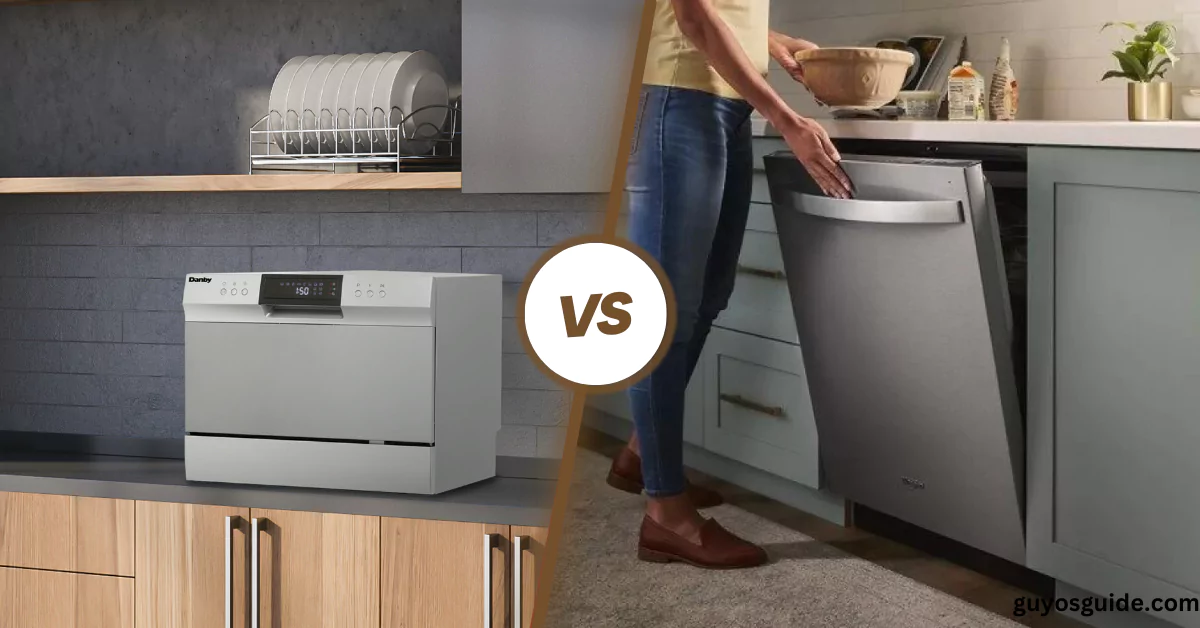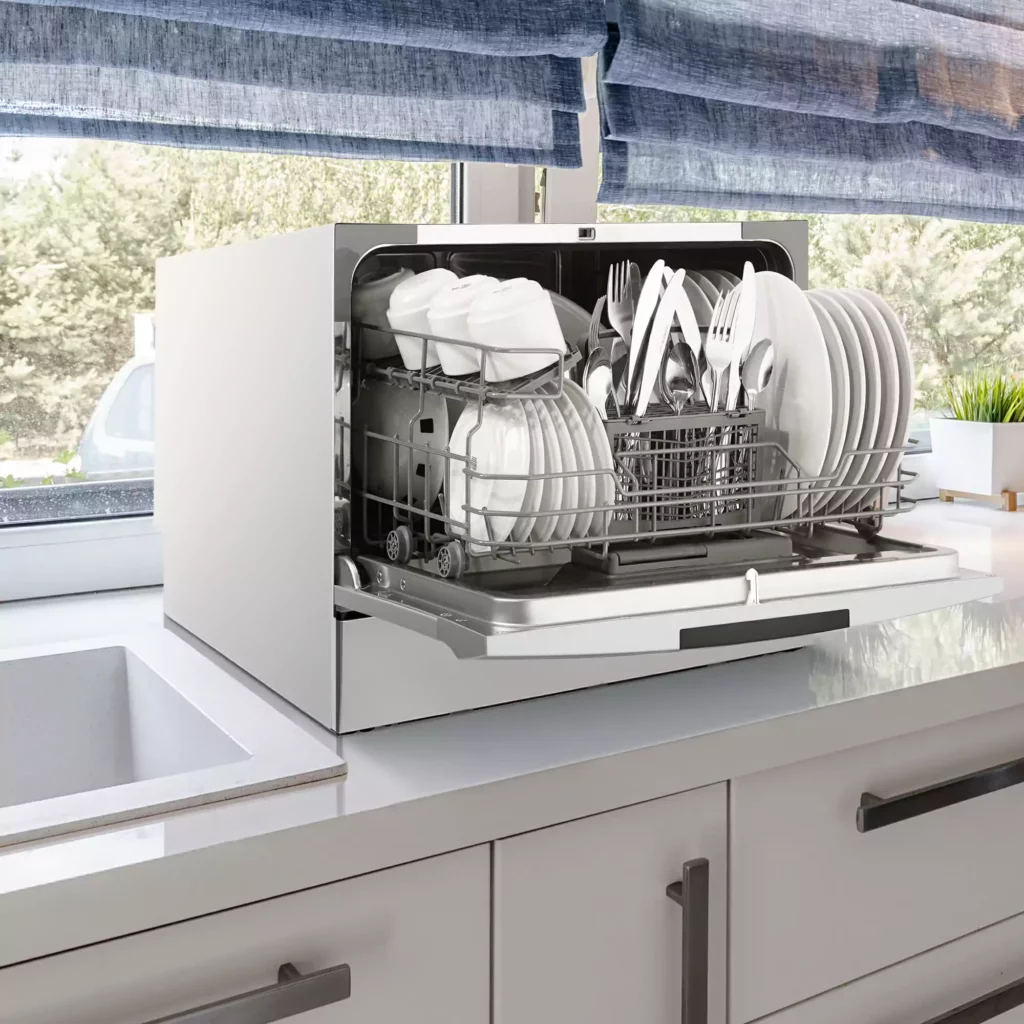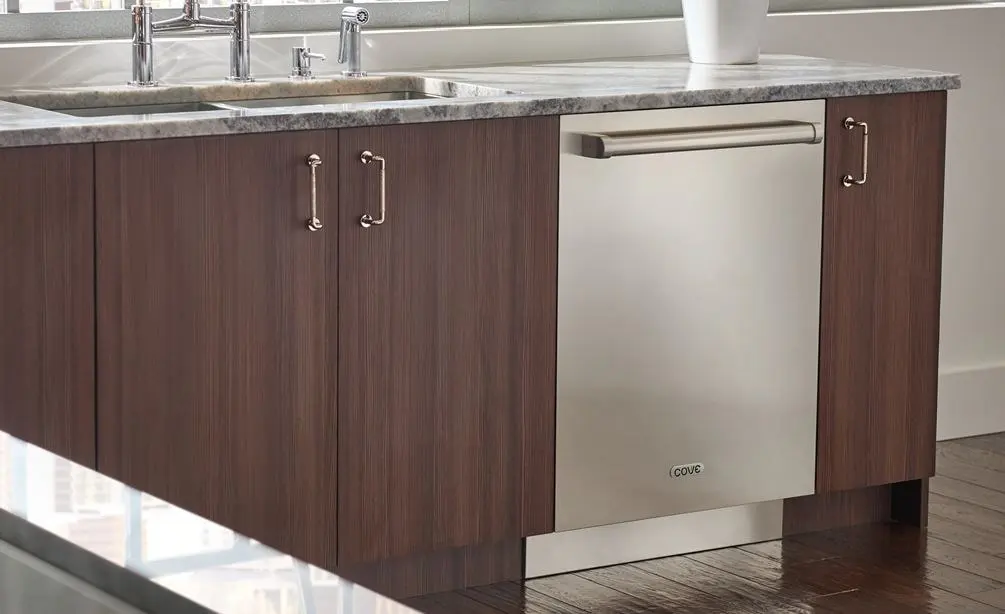Countertop Dishwasher vs Built-in Dishwasher (Compared)


When it comes to choosing a dishwasher for your kitchen, two popular options are countertop dishwashers and built-in dishwashers.
Both offer convenience and efficiency, but they have distinct differences that can impact your decision.
Understanding the pros and cons of each type can help you make an informed choice that suits your lifestyle and space.
In this article, we will compare countertop dishwashers and built-in dishwashers to help you determine which one is the best fit for your needs.
Let’s get started.
Countertop Dishwasher

A countertop dishwasher is a compact and portable dishwasher designed to sit on kitchen countertops.
It provides a convenient and space-saving solution for washing dishes without the need for built-in or under-counter installation.
The primary purpose of a countertop dishwasher is to offer a smaller, more flexible option for individuals or households with limited kitchen space or those who do not require a full-size dishwasher.
Features and Characteristics of a Countertop Dishwasher:
- Compact Size: Countertop dishwashers are smaller in size compared to traditional dishwashers, making them suitable for kitchens with limited space.
- Portability: These dishwashers are often portable, allowing users to move them around as needed or even take them on the go for RVs or small apartments.
- Easy Installation: Countertop dishwashers are designed for easy installation without the need for professional plumbing. They usually connect to the kitchen faucet for water intake.
- Limited Capacity: Due to their compact size, countertop dishwashers have a smaller capacity, accommodating fewer dishes compared to full-size models.
- Energy-Efficient: They are generally more energy-efficient than larger dishwashers, as they use less water and electricity for smaller loads.
- User-Friendly Controls: Countertop dishwashers typically feature user-friendly controls on the front panel, allowing users to select wash cycles and adjust settings.
Pros and Cons of Using a Countertop Dishwasher
Pros:
- Space-Saving: Countertop dishwashers are ideal for kitchens with limited space, providing a space-saving alternative to traditional dishwashers.
- Portability: The portability of these dishwashers allows users to easily move them around or take them to different locations, such as temporary living spaces or RVs.
- Easy Installation: They are easy to install without the need for complex plumbing or professional assistance.
- Energy-Efficient: Countertop dishwashers are often more energy-efficient, consuming less water and electricity for smaller loads.
Cons:
- Limited Capacity: The smaller size means that countertop dishwashers have a limited capacity, requiring more frequent washing for larger households.
- Not Ideal for Large Items: Larger items such as big pots and pans may not fit well in a countertop dishwasher due to its limited space.
- Manual Water Connection: Some models require a manual connection to the kitchen faucet, which may be less convenient than a permanent water connection.
Built-in Dishwasher

A built-in dishwasher is a permanent kitchen appliance designed to be installed under the kitchen counter, typically adjacent to the sink.
It is integrated into the kitchen cabinetry and connected to the plumbing system for water intake and drainage.
The primary purpose of a built-in dishwasher is to provide a convenient and efficient method for cleaning and sanitizing dishes, utensils, and cookware.
Features and Characteristics of a Built-in Dishwasher:
- Permanent Installation: Built-in dishwashers are permanently installed under the kitchen counter, providing a seamless and integrated look in the kitchen.
- Large Capacity: Compared to countertop or portable models, built-in dishwashers typically have a larger capacity, accommodating more dishes per load.
- Integrated Design: These dishwashers are designed to blend seamlessly with the kitchen cabinetry, often featuring a front panel that matches the surrounding décor.
- Connected to Plumbing: Built-in dishwashers are connected to the kitchen plumbing system for water supply and drainage, eliminating the need for manual water connections.
- Multiple Wash Cycles: They offer a variety of wash cycles and settings, allowing users to choose the appropriate cycle for different types of dishes and levels of soiling.
- Quiet Operation: Many built-in dishwashers are designed with noise reduction features, providing quieter operation during the washing cycle.
Pros and Cons of Using a Built-in Dishwasher
Pros:
- High Capacity: Built-in dishwashers typically have a larger capacity, making them suitable for households with larger amounts of dishes.
- Integrated Design: They contribute to a seamless and integrated look in the kitchen, enhancing the overall aesthetic.
- Efficient Water and Energy Use: Built-in dishwashers are often designed to be energy-efficient, using water and electricity more efficiently than some portable models.
- Convenient Operation: Once installed, built-in dishwashers operate conveniently with no need for manual water connections or moving the appliance around.
Cons:
- Requires Installation: Installation can be more complex and may require professional assistance, especially for plumbing connections.
- Limited Portability: Built-in dishwashers are fixed in place, limiting their portability compared to countertop or portable models.
- May Require Modification: Some kitchens may need to be modified to accommodate a built-in dishwasher, which could involve changes to cabinetry or plumbing.
- Cost: Built-in dishwashers can be more expensive than countertop or portable models, considering both the initial purchase and installation costs.
Comparison Between a Countertop Dishwasher and a Built-in Dishwasher
| Feature/Aspect | Countertop Dishwasher | Built-in Dishwasher |
|---|---|---|
| Installation | Placed on the countertop; no permanent installation | Requires professional installation under the counter |
| Size | Compact; suitable for smaller kitchens | Larger; designed to fit standard cabinet spaces |
| Capacity | Typically smaller; suitable for singles or small families | Larger capacity; suitable for larger families |
| Water and Energy Usage | Generally uses less water and energy | May use more water and energy, but more efficient for larger loads |
| Portability | Portable; can be moved easily | Fixed in place once installed |
| Cost | Generally more affordable | Higher upfront cost, but may add value to the kitchen |
| Aesthetics | Can be less integrated with kitchen design | Integrated with kitchen design for a seamless look |
| Features | Limited features compared to built-in models | More advanced features such as multiple wash cycles, adjustable racks, etc. |
| Maintenance | Easier to maintain and repair | May require professional maintenance and repair |
| Noise Level | Tends to be quieter than built-in models | Noise level varies, but some high-end models are very quiet |
| Suitability | Ideal for small kitchens or temporary living situations | Suited for permanent residences and larger kitchens |
FAQs
Are countertop dishwashers suitable for larger families with more extensive dishwashing needs?
Countertop dishwashers typically have smaller capacities and are more suitable for individuals or small families with lighter dishwashing needs.
How do installation requirements differ between countertop and built-in dishwashers?
Countertop dishwashers are usually plug-and-play, requiring no professional installation. Built-in dishwashers, on the other hand, need professional installation as they are integrated into the kitchen cabinets and plumbing.
Which one is more energy and water-efficient?
Countertop dishwashers generally use less water and energy since they are smaller. Built-in dishwashers, while more efficient per load, may use more resources for larger loads.
Do countertop dishwashers offer the same features as built-in models?
Countertop dishwashers may have fewer features compared to built-in models. Built-in dishwashers often come with advanced options such as multiple wash cycles, adjustable racks, and special cleaning modes.
Wrap Up
Choosing between a Countertop Dishwasher and a Built-in Dishwasher depends on individual needs and kitchen dynamics.
The countertop option offers flexibility and affordability, ideal for smaller spaces, while the built-in model provides a seamless, integrated look with advanced features for larger households.
Consider your lifestyle, kitchen size, and preferences to make the right choice for a hassle-free and efficient dishwashing experience tailored to your specific requirements.






